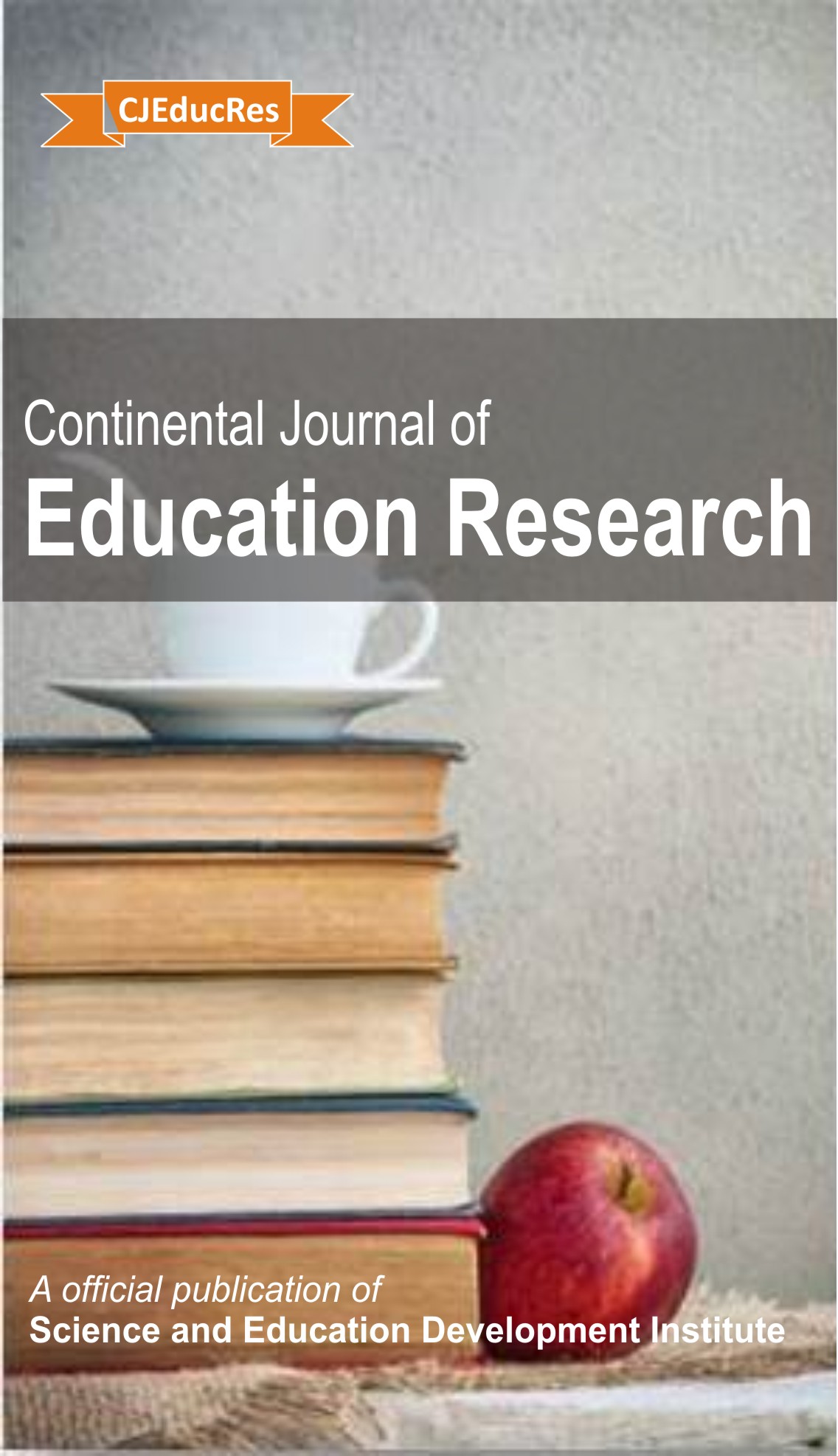
CONTINENTAL JOURNAL OF EDUCATION RESEARCH
Science and Education Development Institute
DOI: 10.5897/UJ-CJEducRes
Email: managingeditor.olawale71@gmail.com
LECTURERS’ SUBJECT KNOWLEDGE AND STUDENTS’ ACADEMIC PERFORMANCE IN OFFICE TECHNOLOGY AND MANAGEMENT
DOI: 10.5897/UJ-CJEducRes.17.005.1 | Article Number: D5D3C23 | Vol.9 (1) - June 2016
Authors: Nwabufo Ngozi B and Akasi Sunday Ebhodaghe
Keywords: Subject Knowledge, Academic Performance, Office Technology and Management
This study examined lecturers’ subject knowledge and students’ academic performance in Office Technology and Management (OTM) at Polytechnics in Osun State. The study adopted descriptive survey design. One research question and one null hypothesis guided the study. The population for the study was 195 made up of all full-time HND I and HND II students of Office Technology and Management departments in the two purposively selected Polytechnics. Data for the study were collected through the use of two instruments: A structured questionnaire titled Lecturers’ Teaching Competencies and Students’ Academic Performance (LSK&SAP) and approved results of previous academic performance of students in ICT related courses. Split-half method was used to determine the scale reliability of the instrument. The reliability coefficient calculated for the study was 0.84. This coefficient is high and positive and therefore the instrument was adjudged reliable. The mean and standard deviations were used to analyze the research question while independent t-test analysis was used to test the hypothesis at 0.05 level of significance. The findings of the study revealed that OTM lecturers at Polytechnics in Osun State are competent in subject knowledge. It was also revealed that subject knowledge has positive significant influence on students’ academic performance. Based on these findings, it was recommended among others that Office Technology and Management curriculum in Polytechnics be made more practical in information and communication technology by providing the needed ICT facilities that would enhance impartation of skills on students.
Adebayo, T. O. (2014). An assessment of education resources available for office technology and management programme in Polytechnics in the south west zone of Nigeria. A paper presented at the conference for academic staff of higher and further education institutions organized by ACME professionals (UK).
Adediwura. A. A., & Tayo, B. (2007). Perception of teachers’ knowledge, attitude and teaching skills as predictor of academic performance in Nigeria secondary school, Educational Research and Review, 2(7) 165-171.
Adu, J. B., & Olatunbosun, P. (2007). Influence of attitudes toward mathematic studies. Journal of Quality Service Application, 2(6) 63-68.
Ajah, O. A. (2011). Evaluation of the training facilities for business studies in polytechnics in the southern states of Nigeria. Journal of Business and Management, 1 (1) 52-60.
Akasi, S. E., & Adebayo, T. O. (2014). Office technology and management: a catalyst for youth employment and self-reliance. Conference paper delivered at SBS annual conference.
Al-Mutairi, A. (2011). Factors affecting business studies performance in Arab open university, case of Kuwait, International Journal of Business and Management. 6(5) 146-155.
Azuka, M. O. (2012). Introduction to Desktop Publishing. Onitsha: Noben Press Ltd.
Commission on Information and Communication Technology (2011). National ICT competency standard for teachers in Nigeria. Retrieved October 20, 2015 from www.nec.gpv.ph/nics-Teachers.
Ezenwafor, J. I. (2011). Adequacy of exposure to information and communication technology by graduating education students of tertiary institutions in Anambra State. Being a paper presented at the 23rd National and 2nd International conference of Association of Business Educators of Nigeria held at the University of Lagos.
Federal Republic of Nigeria (2013). National Policy on Education. NERDC Press Lagos Nigeria. P. 36-37.
Folorunso, I. O. (2006). Effects and solutions to inadequacy of instructional equipment for secretarial studies in our tertiary institutions, COEDAG Journal of Business Education, 1(1), 1-6.
Kang’ahi, M. (2012). Teaching styles and learners’ achievement in Kiswahili language in secondary schools. International Journal of Academic Research in Progressive Education and Development, 1(3), 62-87.
Maduabuchi, I. (2008). A critique of the new curriculum in office technology and management. Business Education Journal 6 (2) 209-220.
Mansfield, B. (2010). Competence in transition. Journal of European Industrial Training, 65 (1) 73-78.
National Board for Technical Education (2004). Curriculum and course specification for National and Higher National Diploma in Office Technology and Management Studies, Kaduna.
Nworgu, G. G. (2006). Educational research: basic issues and methodology. Owerri: Wisdom Pub.
Ojukwu, K., & Ojukwu, F. K. (2012). Competencies related to modern information and communication technologies that need to be infused into business teacher and senior secondary school curricula. Business Education Journal 3(5), 137-146.
Okoji, B. I. (2012). Information and the new challenges in record management. Workshop Proceedings of NAPSSON, 29-49.
Schacter, J., & Thum, Y. M. (2007). Paying for high and low quality teaching, Economics of Education Review, 23; 411-430.
